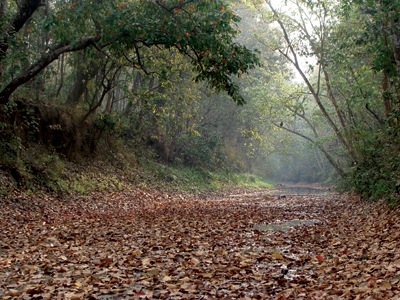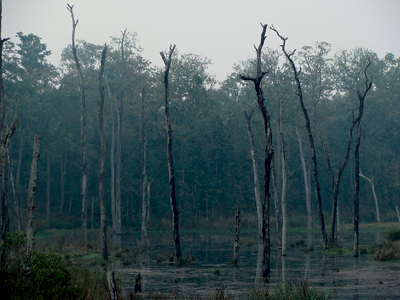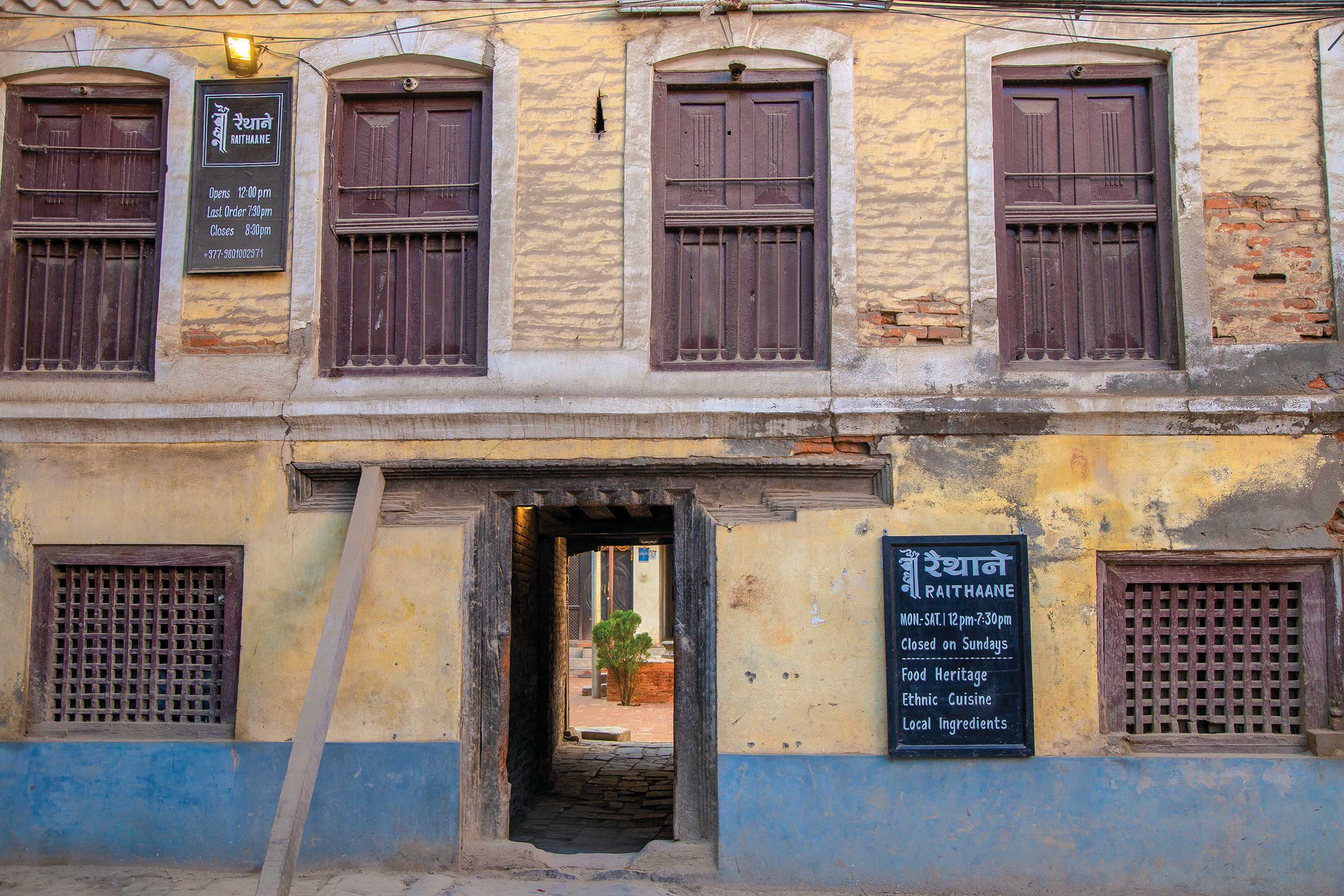With a name as grand, the lake is a little known slice of paradise; one you might not even want to share details about.
 On that morning in early spring, Chitwan’s Beeshazar Tal was like a school playground on a holiday. The wintering birds had left and without them the lake, which is renowned for the diversity of its winter occupants, was a somber expanse of water. In this dearth of life the lake appeared bigger. Because parts of the surrounding forest extended into the lake, creating peninsulas, it was impossible to view the entire lake from one point. We had just begun skirting its south shore when the water started to stir with life. Like boats sailing out to sea, small birds moved towards the center from their hideouts on the shore. Wings flapped and songs rang out.
On that morning in early spring, Chitwan’s Beeshazar Tal was like a school playground on a holiday. The wintering birds had left and without them the lake, which is renowned for the diversity of its winter occupants, was a somber expanse of water. In this dearth of life the lake appeared bigger. Because parts of the surrounding forest extended into the lake, creating peninsulas, it was impossible to view the entire lake from one point. We had just begun skirting its south shore when the water started to stir with life. Like boats sailing out to sea, small birds moved towards the center from their hideouts on the shore. Wings flapped and songs rang out.
Nothing was hurried: jungle fowl sauntered on the gravel road; small birds rummaged in the aquatic plants on the lake; deer fed carelessly. And somewhere deep in the forest a tiger yawned. An eagle took off, beating its big wings laboriously. A kingfisher skimmed over a stream, then returned from his sortie to rest on a twig, content at the sight of fish.
My friends and I were the first people at the lake that morning. Although we were glad to be there, we were also aware of being out of place, like passengers of the lowest class in a ship that had ventured into a masked ball on the upper deck. When we moved we were the only ones out of step in this ancient waltz. Every ray of the sun was gently rousing the jungle, whereas our every move was startling it: our voices were not hushed; we cared not where or on what we trod. We had brought with us the excitement and uncontrolled zeal of the outside world.
Trees in their spring robes of green girdled the lake, their rejuvenated forms reflecting on its waters. In one corner of the irregular lake a charred tree stood forlornly; no limbs, no leaves, just a pole—a reminder to those on the shore of the vanity of earthly greenness. Moor hens took off in alarm at our approach, breaking out of their perfect camouflage. As they fled, their legs trailed on the water for a short distance before they became airborne, etching individual runways on the lake. There were no easy chairs around, no benches, no guides, and no guarantees of seeing something. Wildlife here hadn’t got used to people: the moorhens were still jittery, the eagle reclusive and grumpy, and the kingfisher suspicious.
We crossed a stream on a wooden plank bridge, and sauntered in the anti-current direction. (I doubt if the stream was pro-current, such was the torpor in its flow.) A little turtle swam for cover under decaying leaves. Dry leaves drifted onto the silent stream in happy abandon, cladding it in brown. Sometimes, the dead leaves coming into contact with the ground sounded like the crunching of dry leaves under a careless foot, and we turned our heads in excitement and fear. The track we were walking on was flanked by the stream on one side and dense sal forest on the other. We were on Nature’s highway.
 Like a boy driven by curiosity and the promise of discovery, I frequently wandered off to the track’s edge, which was level with the stream’s high banks. I peered down into the stream to find a convenient place to descend onto it. Trees on both sides of the stream leaned forward as if to embrace each other, and in places where they did, created an arched roof. The stream in this stretch seemed to be asleep under a blanket of dead leaves, awaiting the animals that would arrive to rouse it with their first sip.
Like a boy driven by curiosity and the promise of discovery, I frequently wandered off to the track’s edge, which was level with the stream’s high banks. I peered down into the stream to find a convenient place to descend onto it. Trees on both sides of the stream leaned forward as if to embrace each other, and in places where they did, created an arched roof. The stream in this stretch seemed to be asleep under a blanket of dead leaves, awaiting the animals that would arrive to rouse it with their first sip.
A little upstream, in a tree leaning over the water, I caught the dark figure of an eagle—probably harkening to the sounds of life before he began his daily hunt. I returned to the road and told my friends where I’d seen the eagle. Stealthily we walked forward, hoping to take pictures of the aerial maestro. But, perhaps annoyed at us, he flew out of our cameras’ range, and settled in a tree a little up the road. Taking his flight as an invitation to a challenge, we decided to pursue him. A predator’s stealth prevailed over enthusiasm: on two occasions, he took off suddenly from trees we didn’t know he was in and which were but a few meters from us. Realizing our low position as pursuers, we decided to leave him on his high perch in the trees.
The sudden breaking out of camouflage and beating of wings in alarm, a branch abandoned for another with more screening, a switch from melodious songs to shrill alarm calls, or worse, silence, pointed to the inferiority of our senses, and perhaps, sensibility.
Rebuffed by the feathery recluse, I decided to photograph the dead leaves on the water. As I descended into the stream I saw ahead of me the black, burly figure of a Sambar doe step elegantly across the stream bed. I hurried back onto the road to prevent my friends startling the big deer. I got to them in time and motioned to them to stop. We stood immobile, our eyes fixed on the road ahead. A few seconds later the doe appeared on the road. She stood there, her head turned at a right angle, to study the three odd figures. Moving towards the left, where the slight bend on the road concealed us from the deer’s view, we inched forward. We craned our necks a few times to see if she was still on the track. Eventually, as the road straightened out again, we lost our cover. On closer view, she apparently either lost her curiosity or became cautious, and crashed into the familiarity of the dense forest, away from the unfamiliar faces.
The life on water and branches, behind bushes, in swamps and pastures was pulling us further along the graveled road. We were witnessing a way of life, not just spotting wildlife. Further up the road, we came across a small herd of Chital that was feeding on newly sprouted grass. They noticed our presence and stopped grazing. After they had stared at us without blinking their innocent eyes for a few minutes, they trotted away daintily, halting at regular intervals to turn their heads to look at us. Then they disappeared behind the big trees, without having satisfied their hunger or curiosity.
All the time we had been on the road, I had been thinking how well this place suited the tiger: there was ample prey, sufficient drink and generous cover in the nearby forest. I was hoping that a tiger would walk into the open or roar to announce his presence. Instead, I heard the unexpected purr of a motorbike. It was followed by a jeep, grunting under the weight of its passengers. Alien sounds had invaded, and the sounds that had dominated the place only a few minutes ago withdrew like a wraith into the jungle’s depths. As more people appeared in the area, wildlife and with it wilderness, was pushed into the inner sanctum of the sal trees. The abrupt changes left me with the same feelings of longing and despair as those felt by a dweller of the desert as he watches clouds recede after a drizzle.
Gokarna Forest Resort The Royal Hunting Ground
As you drive along the winding roads that lead you to the gates to Gokarna Forest Resort, its hard to...








